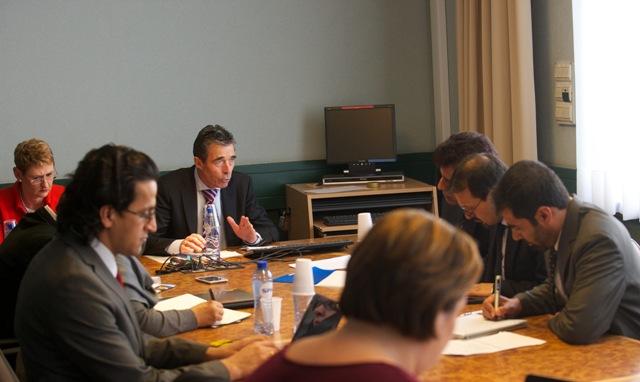BRUSSELS (PAN as a success, ruling out a security vacuum in the country after the withdrawal of foreign troops.
“We will not leave behind a security vacuum. We have carefully planned and prepared how to leave in a way that gives the Afghan people responsibility for their own security and future…” Anders Fogh Rasmussen said.
During a meeting with senior Afghan editors here, he claimed that ISAF had been able to build the capacity of local forces to prevent the country from once again becoming a safe haven. Afghan forces were presently in the lead for 80 percent of security operations.
He sounded up-front on the protection of women might lose international development assistance if it backed out of the commitments it had held out at Bonn and Tokyo conferences.
“I think the political leadership in Afghanistan should realise that if you stick to your commitments, including human rights and women’s rights, then you can count on the international community to provide comprehensive development assistance.”
If the Afghan authorities did not respect human rights and women’s rights, they would find it increasingly difficult getting support from the global fraternity, remarked the secretary-general, who called for maintaining the improvement in that area.
On the political front, the Danish diplomat acknowledged Pakistan could play a constructive role in promoting the Afghan-led reconciliation campaign. “I do believe that the Pakistanis realise that as we approach the end of the ISAF mission, it is in their interest to endure long-term peace and stability in Afghanistan, including through a political process…”
With regard to next year’s elections, he said the primary security responsibility would rest with Afghan forces, with NATO-led troops staying engaged in their combat mission. However, he explained: “We stand ready to assist the ANSF for elections.”
In his opening remarks, the ex-Danish premier said the 50 ISAF partners would discuss with Afghan Defence Minister Gen. Bismillah Mohammadi the progress in Afghan operations, including security transition that began some two years ago, and future plans.
Despite challenges during the period, he insisted, ISAF had made real progress. Two years ago, he recalled, the Afghan forces were only in the lead in Kabul. They had grown more capable and effective because of better training and education and increased strength.
“I know this progress has come at a cost. Some of your soldiers have paid the ultimate prices. They have our deep respect and deserve the full respect of the Afghan people. Thanks to them, the day is coming closer to when security is fully in Afghan hands.
“Let me stress our commitment is firm and for the long term. There is no reason to doubt our commitment…our commitment comes with Afghan commitments. Security is only one part of the challenge,”
Equally important for the Afghan government was promoting good governance, democracy as well as human rights, the NATO chief said, while stressing the need for transparent, inclusive and credible elections.
He also urged the government to strengthen the rule of law, fight corruption and uphold human rights, including the rights of women. “I can assure you that NATO and the broader international community are helping and will continue to help, but it is for the Afghan people to shape the future of Afghanistan.”
mud







GET IN TOUCH
NEWSLETTER
SUGGEST A STORY
PAJHWOK MOBILE APP